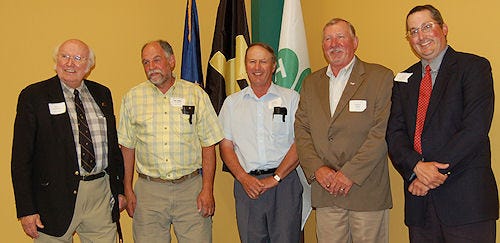
More than 100 people, many of them either past Master Farmers or leaders of ag organizations and agencies, joined together to welcome the new class of Master Farmers into the Master Farmer fold. The long-standing award is now co-sponsored by Indiana Prairie Farmer magazine and the Purdue University College of Agriculture.
Since the August issue contains the Farm Progress Show program, it took longer to assemble than normal. It should hit mailboxes later this week. Once it arrives, check out our special Master Farmer coverage. In the meantime, here's a quick glance at this year's award winners.

Master Farmers receiving awards included, from left, Bruce McKenzie, honorary winner, Lafayette; RD Wolheter, Wolcottville; Maurice Robeson, Flora; Rodney Hager, Orleans; and Chris Mann, Cloverdale.
Rodney Hager, Orleans, drew laughter from the crowd when he said, "I farm about 400 acres of cropland, but if it was all spread out flat, it would be 1,000 acres! I think Tom Bechman will attest to that."
Indeed, it's land so steep that a mid-50's, hefty man like myself would huff and puff to walk up and down. With the aid of local soil and water conservation technicians and the EQIP program, he has excellent stands of orchardgrass, clover and some other grasses on these hills, now divided into seven paddocks for his cattle herd, complete with a watering system.
Chris Mann, Cloverdale, was glad to see Ellsworth Christmas, now retired, in the audience. Christmas is a long-time Purdue agronomist and also served as a Purdue Ag Administrator for a brief period. "This is special to me coming to the Beck Ag Center at the Agronomy Farm to get this ward, because I worked for Dave Mengel, Dr. Christmas and others while getting a masters degree in agronomy," Mann says. "I spent a lot of time on this farm."
Today, he spends time on his own farm, soil testing, making recommendations, pulling tissue tests and doing many of the other things he learned to be valuable while at Purdue.
"We lived the closest of any of the four farmer awardees, and it took 30 years to find Maurice," his wife quipped before the ceremony began. Truth is that Maurice was happy staying under the radar during that period. Now he's gone public, active in the Carroll County Ag Association, helping do some very aggressive behind-the-scenes things to help agriculture's image.
Robeson built one grain system on his own, then sold it. Then he designed the one he operates today, and he and his employees built it from scratch, doing everything but actually erecting the bins. He can unload a semi in a couple minutes or less.
R.D. Wolheter is successful because he learned the lessons of hard times, and practiced them when times got tougher. His hard times came in the early to mid-70's, due to just starting farming, a terrible crop year, and personal problems. By the time the '80s came around, when others were running for cover, he was settling into a groove. He's no-tilled for 25 years, and believes that's contributed to his success.
Watch for more on Master Farmers in the magazine and on the Web.
About the Author(s)
You May Also Like




